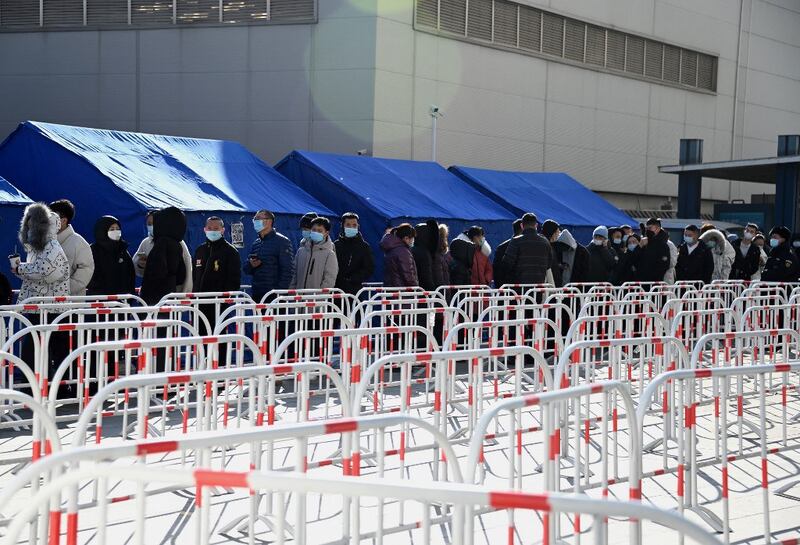As China gears up for the opening of the 2022 Winter Olympics, foreign journalists working in the country warned on Monday that press freedom is declining "at breakneck speed."
While foreign journalists have long faced challenging conditions under the ruling Chinese Communist Party (CCP), now they are also dealing with growing hostility and intimidation, including online stalking, smear campaigns, hacking and visa denials, the Foreign Correspondents' Club of China (FCCC) said in its annual report.
As the number of journalists forced out by the Chinese state grows, covering China is increasingly becoming an exercise in remote reporting, the report said.
"With China pulling out all the stops for the Olympic Games, the FCCC is troubled by the breakneck speed by which media freedom is declining in China," it said, citing 99 percent of foreign journalists as saying in a recent survey that reporting conditions fall below international standards.
Restrictions linked to the COVID-19 pandemic have enabled officials to delay approvals for new journalist visas, cancel reporting trips outside of Beijing, and turn down requests for interviews, the report said.
Nearly half of respondents said their bureaus are understaffed due to COVID-19 travel restrictions, with more than half saying they had been denied access to news-makers or places due to pandemic restrictions.
"Coverage of China is suffering," the FCCC said. "Nothing replaces on-the-ground reporting, free of state obstruction and surveillance."
More than 60 percent of respondents had been obstructed by police or officials last year, while almost all journalists who went to Xinjiang were visible followed throughout their trips, while more than a quarter said their sources had been detained, harassed or questioned more than once following interviews.

Legal action and trolling
There is also a growing legal threat for journalists working in China, it said.
"Chinese authorities also appear to be encouraging a spate of lawsuits or the threat of legal action against foreign journalists, typically filed by sources long after they have explicitly agreed to be interviewed," the FCCC said.
It said "state-backed attacks" including online trolling of foreign journalists is also on the increase.
"Such campaigns have fostered a growing feeling among the Chinese public that foreign media are the enemy and directly encourage offline violence and harassment of journalists in the field," the group said, adding that many have left the country to protect themselves and their families.
Authorities in Beijing, Tianjin and Hangzhou have stepped up anti-COVID-19 measures after 20 locally transmitted cases of the virus were confirmed in Beijing, 11 in Tianjin and 24 in Hangzhou.
Beijing resident Guo Li said the authorities there are sticking to the CCP's "zero-COVID" policy ahead of the Games.
"The situation in Beijing is that it's pretty bad in Fengtai district, with suspected cases being placed under compulsory quarantine and observation until there is a negative PCR test," Guo told RFA. "I heard it will be more or less impossible for anyone who has left Beijing to get back into the city while the Winter Olympics are going on."
'Stability maintenance'
A resident of neighboring Hebei province surnamed Wang said the province is being used as a buffer zone to protect the capital.
"Hebei is being used as a wall around Beijing, protecting it," Wang said. "It has gotten harder and harder to get into Beijing from Hebei."
"If you want to get out of Beijing, you need a certificate, and you have to wait for a notification before you can get back in again," he said.
Meanwhile, district and township officials around Beijing are ordering people to reduce the size of their Lunar New Year gatherings, or even banning them outright.
Any petitioners pursuing long-running complaints against the government in Beijing are being placed under house arrest by local officials from their hometowns.
"They are detaining people now for stability maintenance," a petitioner who declined to be named told RFA. "Most petitioners are under house arrest, with three, four or five people watching them 24 hours a day."
While some are being placed under surveillance in Beijing, the majority have been prevented from leaving their hometowns, they said.
"All of them were taken into custody," the petitioner said. "Some were sent to the Communist Party School, some were put in quarantine, where they are being watched at home."
"Petitioners from Jilin were detained in local hotels from Jan. 23, while petitioners from Dalian have been held under house arrest for more than 40 days by the local police," they said.
The Beijing Bureau of Commerce issued guideline on Jan. 30 calling on families to limit private dinners to less than 10 people, and for traditional New Year's Eve dinners to last no longer than two hours.
Translated and edited by Luisetta Mudie.
